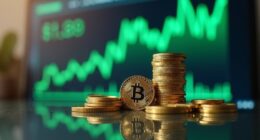Igniting a firestorm of debate, Peter Schiff, a renowned economist, has publicly savaged Donald Trump’s audacious threat of a 50% tariff on EU imports, branding it blatant market manipulation in a scathing X post. With a tone sharper than a razor, Schiff decries this move as a political ploy for market advantage, not a principled stand. Why, one must ask, does a tariff dwarfing those on Chinese goods—already burdensome—target a key ally like the EU? Is this strategy, or sheer recklessness, masquerading as strength?
The market, predictably, shuddered under the weight of such brash posturing, with Bitcoin plummeting to $108,000 while gold and yen, those tired havens, surged amid the chaos. Schiff, never one to mince words, warned that insiders could exploit this uncertainty, turning instability into profit while the average investor reels. This isn’t just a policy blunder, he implies—it’s a rigged game, and guess who’s left holding the bag? Meanwhile, EU Trade Commissioner Maroš Šefčovič fired back, vowing to shield EU interests, hinting at retaliatory tariffs that could spiral into a full-blown trade war. Diplomacy hangs by a thread, yet tensions soar. Schiff’s perspective aligns with broader economic concerns, as he argues that such tariff threats distort free market principles tariff threats distort. Adding to the turmoil, Santiment’s analysis connects Bitcoin’s recent price drop to this tariff drama, suggesting a repeat of past market declines tariff drama impact.
Schiff’s critique cuts deeper, predicting economic self-sabotage—higher consumer prices, rampant inflation, and a dangerous reliance on foreign goods as domestic resources falter. Does Trump truly believe this addresses trade deficits, or is it mere theater, a distraction from deeper failures? Even his Bitcoin superpower ambitions clash with such protectionism, a contradiction Schiff skewers with relish. Unilateral moves like this, history warns, risk global trade collapse, eroding investor trust. Amid this uncertainty, the Fear and Greed Index could signal potential market sentiment shifts for crypto investors navigating such volatility. Will anyone hold this gamble accountable, or are we doomed to watch markets—and reason—crumble under ego-driven policy? The stakes, frankly, couldn’t be higher, and Schiff’s alarm demands an answer.









